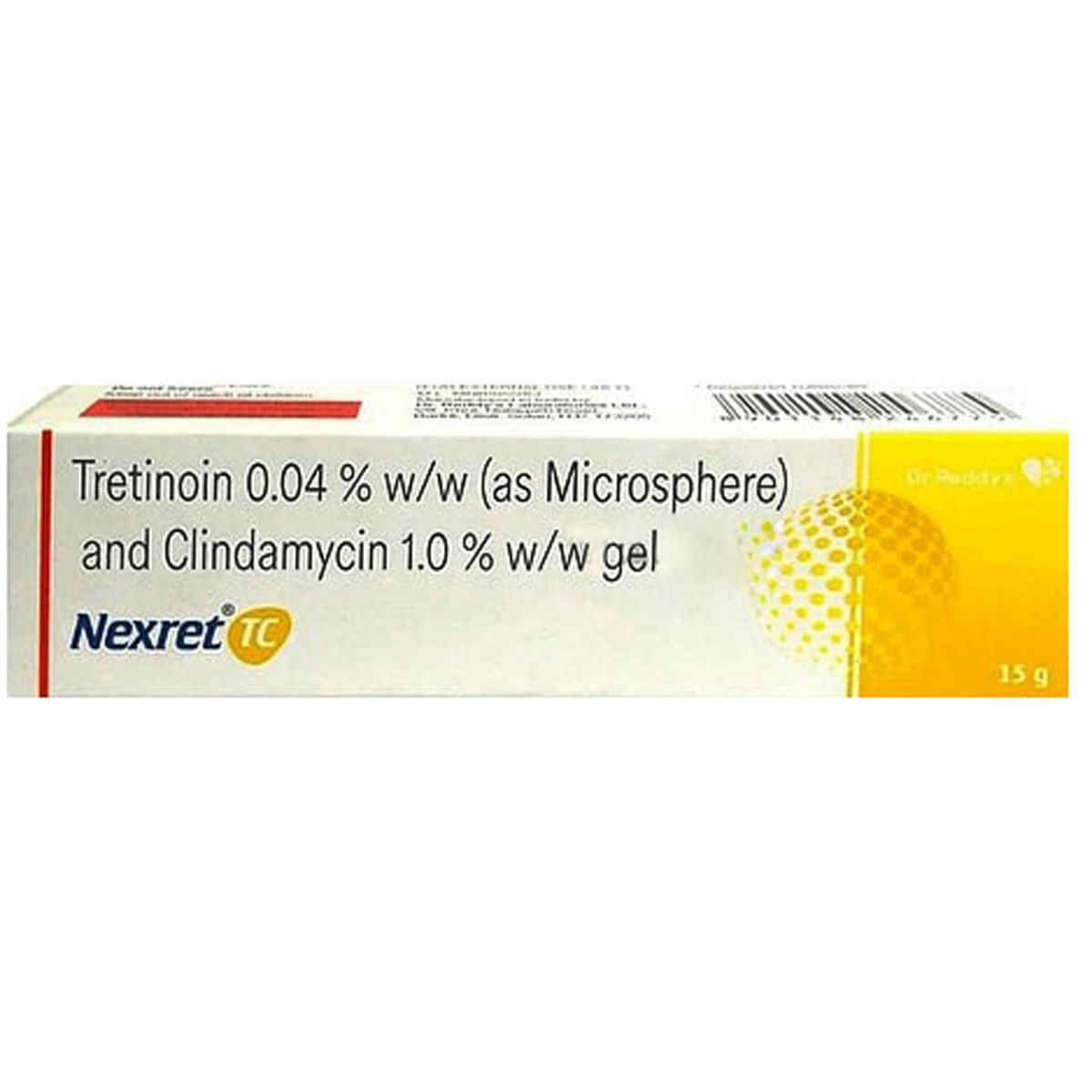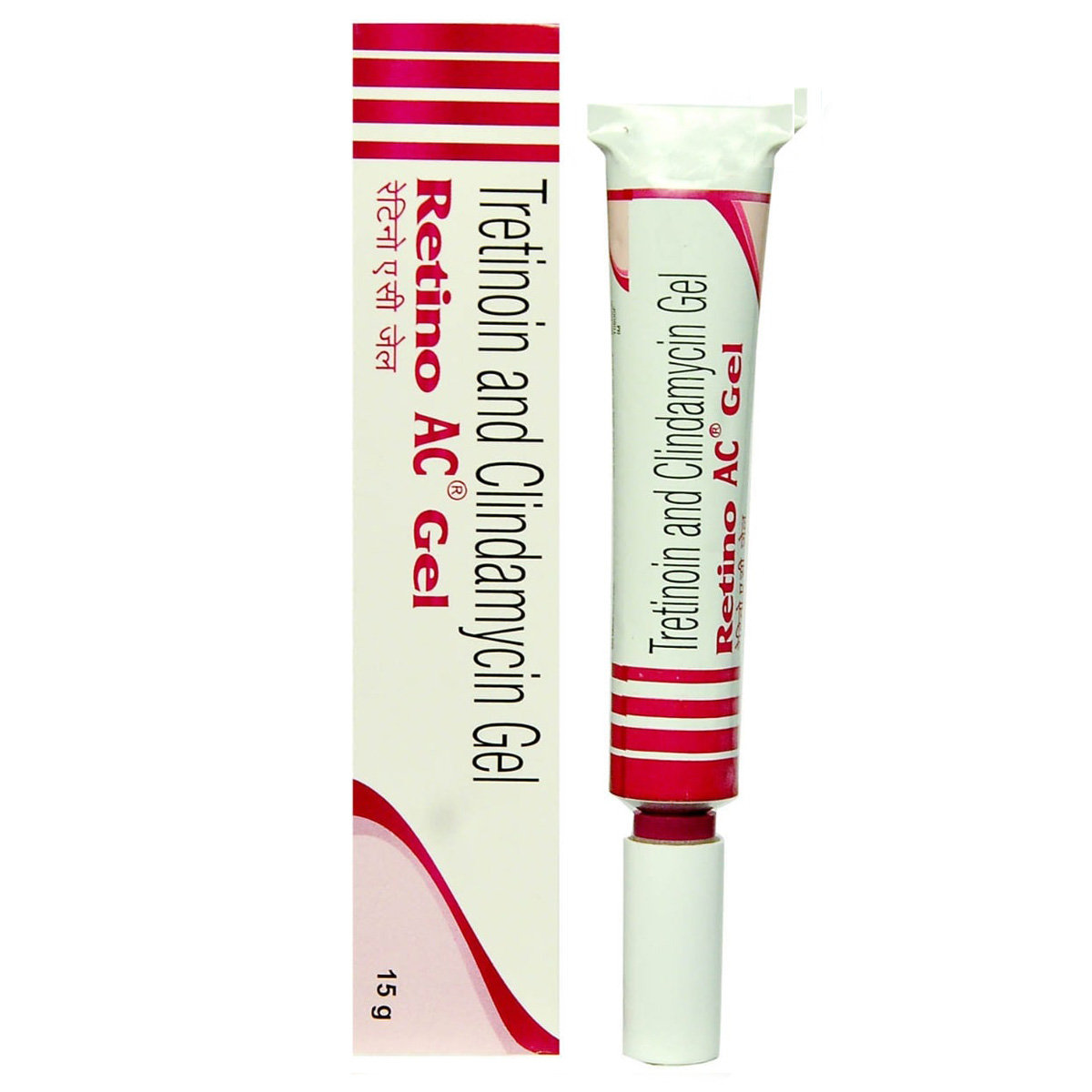Tretinoin+clindamycin
About Tretinoin+clindamycin
Clindamycin+tretinoin belongs to the class of dermatological preparations called 'antiacne' used to treat acne (pimples). Acne is a common skin condition and occurs when hair follicles are blocked with dead skin cells and oil. The acne-causing bacteria feeds on sebum (natural oil produced by skin) causing redness and swelling.
Clindamycin+tretinoin is a combination of two medicines, namely: Tretinoin (vitamin A) and Clindamycin (antibiotic). Tretinoin is a form of vitamin A that reduces oil production in the skin, replenishes the skin, and helps keep your pores open. Clindamycin belongs to the class of antibiotics that inhibits the production of essential proteins that are necessary for bacteria to grow, multiply, and increase in numbers. Altogether it stops or slows down the growth of bacteria and prevents the growth of acne.
Take Clindamycin+tretinoin as prescribed by your doctor. You are advised to take Clindamycin+tretinoin for as long as your doctor has prescribed it for you depending on your medical conditions. You may experience application site reactions (burning, irritation, itching, and redness), dermatitis, skin peeling, and dryness. Most of these side effects of Clindamycin+tretinoin do not require medical attention and gradually resolve over time. However, if the side effects are persistent, reach out to your doctor.
If you are known to be allergic to Clindamycin+tretinoin or any other medicines, please tell your doctor. If you have a chronic inflammatory bowel disease (e.g. Crohn’s disease or ulcerative colitis). If you are suffering from other acute inflammatory conditions of the skin (e.g. folliculitis), especially around the mouth (perioral dermatitis). If you have a history of colitis with past antibiotic use which is characterized by prolonged or significant diarrhoea or abdominal cramps. Do not apply Clindamycin+tretinoin to cuts, open wounds, broken, sunburnt, or sensitive skin areas. Avoid sun exposure while using Clindamycin+tretinoin as it may make the skin more sensitive to sunlight and cause sunburn. Wear protective clothing and use sunscreen while going out to protect your skin from sunburn. If you have intestine problems or eczema, please inform your doctor before taking Clindamycin+tretinoin. If you are pregnant or breastfeeding, please inform your doctor before taking Clindamycin+tretinoin.
Uses of Tretinoin+clindamycin
Medicinal Benefits
Clindamycin+tretinoin is a combination of two medicines, namely: Tretinoin (vitamin A) and Clindamycin (antibiotic) primarily used to treat acne (pimples). Tretinoin is a form of vitamin A that reduces oil production in the skin, replenishes the skin, and helps keep your pores open. Clindamycin belongs to the class of antibiotics that inhibits the production of essential proteins that are necessary for bacteria to grow, multiply, and increase in numbers. Altogether it stops or slows down the growth of bacteria and prevents the growth of acne.
Directions for Use
Storage
Side Effects of Tretinoin+clindamycin
- Application site reactions (burning, irritation, itching and redness)
- Dermatitis
- Skin peeling
- Dryness
Drug Warnings
If you are known to be allergic to Clindamycin+tretinoin or any other medicines, please tell your doctor. If you have a chronic inflammatory bowel disease (e.g. Crohn’s disease or ulcerative colitis). If you are suffering from other acute inflammatory conditions of the skin (e.g. folliculitis), especially around the mouth (perioral dermatitis). Avoid sun exposure while using Clindamycin+tretinoin as it may make the skin more sensitive to sunlight and cause sunburn. Wear protective clothing and use sunscreen while going out to protect your skin from sunburn. If you have a history of colitis (chronic digestive disease) with past antibiotic use which is characterized by prolonged or significant diarrhoea or abdominal cramps. Do not apply Clindamycin+tretinoin to cuts, open wounds, broken, sunburnt, or sensitive skin areas. Avoid sun exposure while using Clindamycin+tretinoin as it may make the skin more sensitive to sunlight and cause sunburn. Wear protective clothing and use sunscreen while going out to protect your skin from sunburn. If you have intestine problems or eczema, please inform your doctor before taking Clindamycin+tretinoin. If you are pregnant or breastfeeding, please inform your doctor before taking Clindamycin+tretinoin.
Drug Interactions
Drug-Drug Interactions: Clindamycin+tretinoin may interact with antibiotics (erythromycin, metronidazole), blood thinner (warfarin), keratolytic agents (benzoyl peroxide, salicylic acid), and skeletal muscle relaxants (atracurium, cisatracurium).
Drug-Food Interactions: If you are taking grapefruit juice or alcohol, please inform your doctor before taking Clindamycin+tretinoin.
Drug-Disease Interactions: If you have intestine problems or eczema, please inform your doctor before taking Clindamycin+tretinoin.
Drug-Drug Interactions Checker List:
Safety Advice

Alcohol
cautionThe interaction of Clindamycin+tretinoin with alcohol is unknown. Please consult a doctor before consuming alcohol while using Clindamycin+tretinoin.

Pregnancy
cautionDo not use Clindamycin+tretinoin if you are pregnant or thinking of becoming pregnant. Your doctor can give you more information.

Breast Feeding
cautionThe safety of Clindamycin+tretinoin in breastfeeding mothers is unknown. Therefore, you should not use it if you are breastfeeding.

Driving
safe if prescribedClindamycin+tretinoin usually does not affect your ability to drive or operate machinery.

Liver
safe if prescribedIf you have any concerns regarding the use of Clindamycin+tretinoin in patients with Liver problems, please consult a doctor.

Kidney
safe if prescribedIf you have any concerns regarding the use of Clindamycin+tretinoin in patients with kidney problems, please consult a doctor.

Children
unsafeClindamycin+tretinoin is not recommended for children below 12 years as the safety and effectiveness were not established.
Habit Forming
Diet & Lifestyle Advise
- Avoid sun exposure while using Clindamycin+tretinoin as it may make the skin more sensitive to sunlight and cause sunburn. Try to wear protective clothing and use a sunscreen while going out to protect your skin from sunburn.
- Regular exercise can improve your mood and self-esteem though it doesn’t clear acne. Take a shower immediately after finishing exercise as sweat may irritate acne.
- Do regular hair wash regularly and avoid hair falling across the face.
- Remove the make-up completely before going to bed.
- Avoid using products that may cause skin irritation such as harsh soaps, skin cleansers, shampoos, hair removers or waxes, hair colouring or permanent chemicals, detergents, and rough fabrics.
Special Advise
- You are advised to apply any other lotions, creams, or ointments including cosmetics and moisturizers after 30 minutes of applying Clindamycin+tretinoin as using both simultaneously may reduce the effectiveness of Clindamycin+tretinoin.
- Avoid contact of Clindamycin+tretinoin with nose, mouth, eyes, or ears. In case Clindamycin+tretinoin comes in contact with these areas accidentally, rinse with water.
- Do not squeeze, pop, or pick spots as it may worsen them and cause permanent scarring.
Patients Concern
Disease/Condition Glossary
Acne (pimple): It is a common skin condition that occurs when hair follicles are blocked with dead skin cells and oil, causing pimples, whiteheads, and blackheads. Acne affects people of all ages but is most common among teenagers. Acne symptoms include pus-filled pimples, uninflamed (not swollen) blackheads, red, large, and tender bumps. The treatment for acne includes certain creams, cleansers, and antibiotics.
FAQs
Clindamycin+tretinoin lightens post-acne dark spots by switching the damaged skin cells with newer ones. Thus, it lightens the tone of the skin and makes it brighter and stronger than before.
No, Clindamycin+tretinoin is not recommended for eczema (itchy, cracked, swollen, or rough skin) patients as it may increase the risk of severe irritation. Therefore, if you are suffering from eczema, inform your doctor before using Clindamycin+tretinoin.
Yes, Clindamycin+tretinoin may cause skin irritation or sensitivity as a side effect. However, if the irritation persists or worsens, stop using Clindamycin+tretinoin and consult a doctor.
Yes, Clindamycin+tretinoin may cause dryness of the skin. You can use a moisturizer while using Clindamycin+tretinoin to prevent dry skin. However, do not apply Clindamycin+tretinoin and moisturizer simultaneously as it may reduce the effectiveness of Clindamycin+tretinoin. Please consult a doctor before using other products with Clindamycin+tretinoin.
Clindamycin+tretinoin works by replacing damaged skin cells with newer ones, thus restoring the skin. However, it may take up to three to six months to complete noticeable results. It might take longer in a few cases, dependent upon the colour of the post-acne inflammatory pigmentation being treated, relative to the normal surrounding skin.







